Average Cost of Shiba Inu Dogs Explained

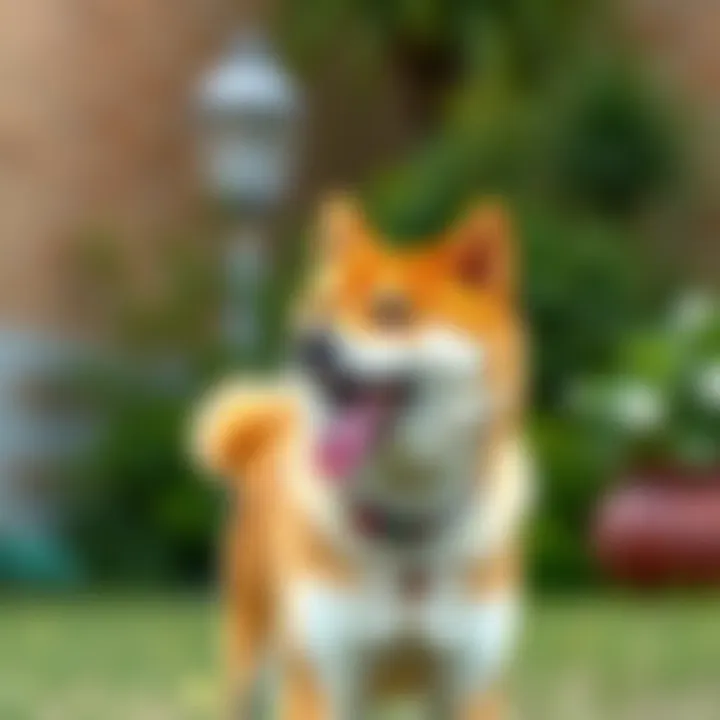
Intro
The Shiba Inu, a breed that hails from Japan, has become increasingly popular around the globe. Their fox-like appearance and spirited personality make them appealing to potential dog owners. However, before you rush out to adopt or buy a Shiba Inu, it's essential to understand the average price and what influences that cost. This guide explores the financial factors involved, aiming to equip you with the knowledge needed for this significant commitment.
When thinking about a Shiba Inu, it's not just about the initial purchase price. There are several variables at play, such as the reputation of breeders, geographical location, and ongoing costs associated with taking care of these spirited canines. By grasping these concepts, you can better plan your finances and ensure that you're making an informed decision.
Factors Affecting the Average Price
- Breeder Reputation: Some breeders are well-respected in the community. They invest time, resources, and expertise into their dogs, leading to a higher price tag.
- Location: Prices can vary wildly depending on where you live. Urban settings may host higher costs due to demand, while rural areas might offer lower prices.
- Dog’s Pedigree: If a Shiba Inu comes from a lineage with championship titles, expect to dig deeper into your pocket.
- Age and Health: Puppies often carry a heftier price than older dogs. Moreover, those with health certifications could cost more initially but save in long-term medical expenses.
Ongoing Expenses
Let’s not overlook the fact that the initial price is just the tip of the iceberg. Owning a Shiba Inu involves numerous additional expenses:
- Food: Quality dog food isn't cheap, and Shibas tend to eat on the higher side of the spectrum.
- Vet Costs: Regular check-ups, vaccinations, and unforeseen health issues can pile up quickly.
- Grooming: Shiba Inus are known for their double coats that require grooming, meaning regular visits to the groomers or at least some investment in grooming tools.
- Training: Investing in training early on can make a world of difference in your Shiba's behavior, so consider costs for classes or training resources.
"Owning a Shiba Inu is about commitment, and understanding the costs involved is the first step to a happy companionship."
Final Thoughts
Diving into the purchase of a Shiba Inu is an enriching journey, but it's not all sunshine and rainbows. By knowing what to expect in terms of pricing and ongoing expenses, you'll prepare yourself for the challenges ahead. Ultimately, this preparation allows you to provide the love and care that your future furry friend deserves.
Intro to Shiba Inu Pricing
Potential buyers need to weigh several factors before bringing a Shiba Inu into their lives. The cost of acquiring such a beloved pet can fluctuate widely based on various elements, including breeder reputation, geographic location, and market demand. A robust grasp of these tidbits helps in navigating the market efficiently, ensuring you are not just investing from a financial perspective but making informed choices about the wellbeing of the puppy and the experiences you wish to cultivate together.
Overview of the Breed
The Shiba Inu is a breed that often captures the hearts of many with its fox-like appearance and spirited character. Hailing from Japan, it boasts a proud history as a hunting dog, yet today, it makes a charming companion for numerous families. These dogs are deceptively agile, with a confident demeanor that often makes them a bit aloof but still affectionate towards their owners.
Understanding their temperament and behavior is crucial for prospective owners. They are known to be energetic, smart, and quite independent, which can influence the training methods you may need to implement. It’s crucial to recognize that owning a Shiba Inu might not be a walk in the park; they require training consistency, mental stimulation, and social interaction. Be prepared to invest time and energy into nurturing the right behaviors, as these traits can contribute to the overall long-term happiness of both the dog and the owner.
Popularity and Market Demand
The rise in popularity of the Shiba Inu in recent years has significantly impacted its market demand and pricing structure. Platforms like Instagram and TikTok have further propelled this breed into the spotlight, with many influencers showcasing their Shiba Inu companions. Additionally, their presence in popular culture—like the famous Doge meme—has contributed to a surge in interest.
A higher demand generally translates to inflated prices, as more individuals are drawn to adding a Shiba Inu to their family. Number of factors play into this demand, including their relatively unique look and personality traits which many find appealing. Some buyers are even willing to pay a premium, purely based on perceived desirability. With existing competition, prospective owners should be prepared to act rather swiftly when finding their ideal pup, as the more desirable Shibas can be snatched up quicker than you can say "Shiba Inu"!
"When demand increases, so do prices. Knowing the landscape helps you better navigate your prospective purchase to avoid unexpected costs."
In this context, being informed can save you a pretty penny, ensuring you are well-equipped to handle both the initial costs and subsequent investments that might arise after welcoming a Shiba Inu into your home.
Factors Influencing Average Price
When it comes to understanding how much you might shell out for a Shiba Inu, there are several pivotal factors that come into play. These elements don’t just shape the price tag; they also give insight into what you can expect in terms of quality, health, and the overall experience of dog ownership. Knowing these factors helps prospective owners make well-informed choices as they navigate the lively Shiba Inu landscape.
Breeder Reputation
A breeder's reputation can be the critical make-or-break factor when it comes to cost. Well-established breeders, known for maintaining high standards of breeding, often charge more. They might invest in health screenings and socialization practices that lead to well-adjusted pups.
In contrast, backyard breeders or those without a strong pedigree often offer lower prices, but this can come with significant risk. Health issues might emerge down the line, leading to higher costs overall. Therefore, while it might be tempting to save a few bucks up front, it's essential to weigh the long-term implications of your choice. Look for breeders who are transparent about their practices and provide records of the puppies’ health. Breeders who are members of recognized organizations, such as the American Kennel Club or regional kennel clubs, usually have a track record that can provide peace of mind.
Pedigree and Lineage
The lineage of a Shiba Inu plays a crucial role in determining price as well. Dogs from champion bloodlines, often featuring prime traits in terms of temperament, appearance, and health, can command significantly higher prices. This investment often translates to dogs that not only look like pure-breds but also possess desirable qualities handed down through generations. Furthermore, if the dog is intended for show or breeding purposes, the pedigree can drastically raise the cost. A dog without a strong lineage might still be a wonderful companion, but its price will likely reflect that lack of prestigious ancestry.
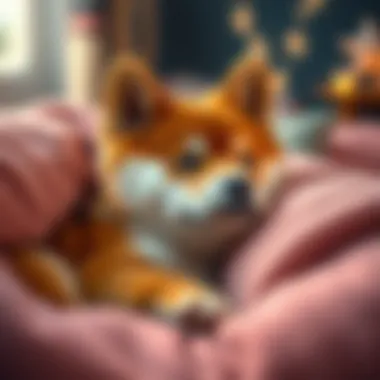

Location
Geographical factors also cannot be dismissed when discussing Shiba Inu prices. In urban areas where demand is high, you might find that prices soar compared to rural settings. Additionally, certain regions have more Shiba Inu enthusiasts, leading to increased competition and, consequently, higher prices. Understanding local market trends can guide your search. For instance, cities like San Francisco or New York may carry a hefty premium compared to smaller towns, making it advisable to explore various regions if you're seeking a Shiba Inu at a lower price point.
Age and Health Considerations
An essential aspect that directly affects price is the age and health of the puppy. Generally, younger puppies come with a higher price because of their demand and the anticipation of a longer life with owners. Moreover, animals that have been health tested, including vaccinations and check-ups, often reflect a higher initial cost. Buyers must also remember that a hefty price tag does not guarantee a healthy dog. Research and verification of health records can prove invaluable in ensuring your investment is sound, ultimately enhancing the likelihood of a positive outcome in your pup's life.
Market Trends
Market trends can fluctuate based on seasons or economic considerations, impacting Shiba Inu pricing as well. For instance, during holidays or certain seasons, more puppies might be available, potentially lowering prices due to increased supply. On the other hand, during a surge in popularity—occasionally influenced by pop culture, social media, or viral sensations—the prices could unexpectedly balloon. By keeping abreast of these market trends and being patient, you can secure a better deal while avoiding inflated prices.
Current Average Price Range
When contemplating the acquisition of a Shiba Inu, grasping the current average price range is essential. It not only reflects the immediate financial outlay involved in bringing one of these spirited canines into your home, but also serves as a compass for understanding overall market dynamics. The price of a Shiba Inu can fluctuate widely based on a number of considerations including breeding practices, geographic location, and more. By examining these elements closely, potential owners can make more informed decisions, ensuring they allocate their resources wisely and responsibly.
Cost Breakdown by Age
The age of the Shiba Inu plays an important role in determining its price. Generally, younger puppies demand a higher price due to their novelty and perceived potential for training. For instance, a Shiba Inu puppy under the age of six months might be priced between $1,500 and $3,500. This is significant as most buyers hope to train them from a young age, aiming for that ideal family pet.
On the other hand, older dogs can sometimes be found at lower prices. Once they exceed the two-year mark, the pricing tends to stabilize or even decrease, ranging from $800 to $2,000 depending on their health and past training experiences. In some cases, breeders may even offer discounts for older dogs in order to find them new homes quickly. The age spectrum also impacts the expectation of care and training needed, as older dogs may come with some prior skills or health challenges that budget-conscious buyers should weigh into their calculations.
Regional Price Variance
Location greatly influences the price of Shiba Inus. Urban markets often inflate costs due to heightened demand and competition among buyers. For instance, in metropolitan areas like New York City or Los Angeles, prices can soar to between $2,000 and $5,000 as distinguishing features become craved by city dwellers eager for unique pets.
Conversely, in less populated or rural regions, one can potentially find prices slashed by as much as 25%. For example, in some parts of the Midwest or South, prices may fall between $1,000 and $2,500. This disparity can sometimes be attributed to economic factors, but it often boils down to the density of potential buyers in any given area. Prices can reflect the local market's appetite, leading savvy buyers to carefully consider where they want to source their new companion.
Comparison with Other Breeds
When juxtaposing the price of a Shiba Inu against other dog breeds, interesting patterns emerge. Generally speaking, Shiba Inus land in the mid to higher price range when compared to other popular breeds such as Golden Retrievers or Bulldogs. A Golden Retriever typically can be obtained for about $800 to $2,500, whereas a Bulldog may command a similar range of $1,500 to $4,000. In many places, the Shiba Inu's pricing positions it as a desirable but relatively affordable option within the luxury pet market, appealing to owners seeking a charming yet spirited selection.
By understanding where Shiba Inus land in the broader scope of prices for dog breeds, prospective pet owners can gauge whether they are willing to spend for the unique characteristics and traits that these dogs present.
"Before diving into the ownership of a Shiba Inu, knowing the financial implications helps pave the path to a more fulfilling experience with your future furry friend."
Associated Expenses of Ownership
When considering a Shiba Inu or any pet for that matter, it’s crucial to grasp the full scope of ownership expenses involved beyond just the purchase price. Having a clear understanding of these costs can significantly affect your decision-making process. Owning a Shiba Inu can be a joyous journey, but it comes with financial commitments that, if overlooked, can lead to unexpected strains on your wallet. Here’s a detailed breakdown of associated expenses that prospective Shiba Inu owners should keep in mind.
Initial Setup Costs
Initial setup costs refer to the expenses incurred before bringing your new Shiba Inu home. These costs can add up quicker than one might expect. Key items include:
- Crate and Bed: A sturdy crate provides a secure place for your dog. An adequate bed will ensure they have a comfortable resting place.
- Food and Water Bowls: Opt for durable materials like stainless steel, which will make feeding and cleaning easier.
- Leash and Collar: A good leash and collar are essential for safe walks. Make sure they fit well but not too tight.
- Toys: Shiba Inus need mental stimulation. Purchase a variety of toys to keep them engaged.
- Grooming Supplies: Investing in grooming tools can save money in the long run by allowing you to manage their care at home.
- Home Safety Adjustments: Ensure your home is pet-proofed, which might include baby gates or hiding away hazardous items.
Setting aside anywhere from $300 to $800 for these initial expenses can be a good rule of thumb.
Ongoing Maintenance Costs
Once you have your beloved Shiba Inu at home, the monthly maintenance costs can begin to pile up. These include:
- Food Costs: Depending on the quality of dog food you choose, expect to spend about $50 to $100 each month.
- Grooming: Regular grooming is essential for maintaining their coat, which can be done at home or through a professional. Budget around $30 to $50 per month if you opt for professional services.
- Dog supplies: Ongoing needs for toys, treats, and basic supplies should be included in your monthly expenses, approximately $20 to $40.
- Pet Insurance: This can help offset the costs of unexpected vet visits. Average premiums vary widely based on coverage but can be around $30 to $80 per month.
It’s wise to account for at least $150 to $300 each month for these maintenance expenses.
Healthcare Expenses
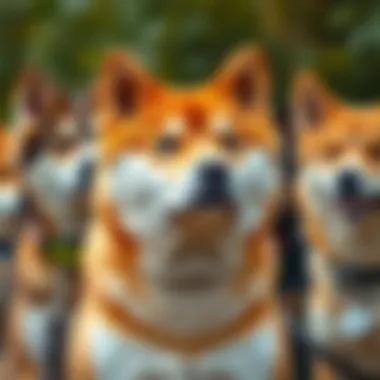
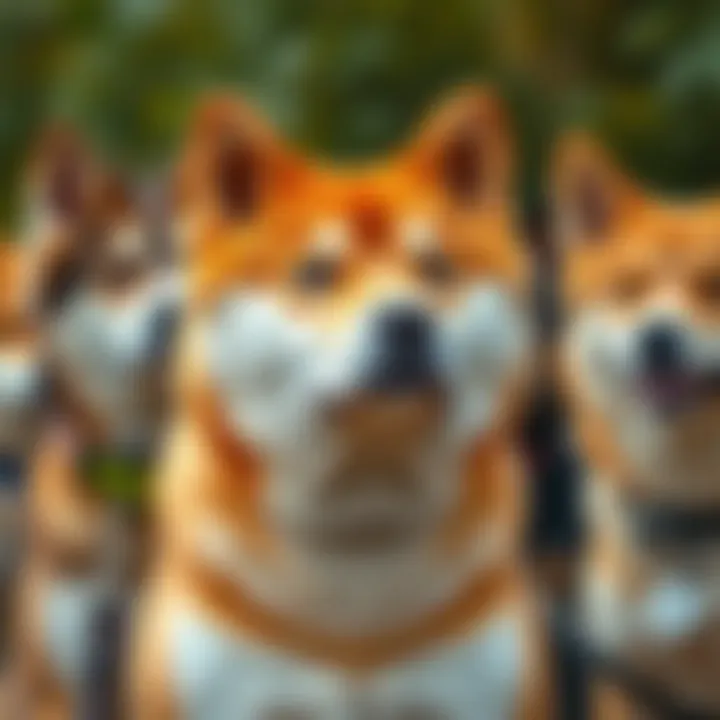
Healthcare is a major aspect of pet ownership that often catches many off guard. Regular check-ups, vaccines, and unexpected health issues can become quite costly. Consider the following:
- Annual Vet Visits: Regular check-ups typically run from $60 to $150 per visit, depending on your location.
- Vaccinations: Initial puppy shots can be around $75 to $100, with booster shots later on costing an additional $50.
- Preventive Care: Flea/tick prevention and heartworm medication add additional costs, usually around $30 to $70 monthly.
- Unexpected Illness or Injury: Having an emergency fund for unforeseen medical issues is crucial. Vet bills can escalate quickly, so having set aside a couple of thousand dollars for emergencies can ease that burden.
All said, budgeting a few hundred dollars annually or even more for health expenses helps ensure you’re ready for any issues that may arise.
Training and Socialization
Training and socialization are crucial for your Shiba Inu’s development. Investing in these areas can lead to a well-adjusted pet that fits perfectly into your lifestyle. Key aspects include:
- Professional Training Classes: These can range from $100 to $300 depending on what’s being offered. Investing in training during puppyhood sets a solid foundation.
- Socialization Activities: Puppies should be exposed to different environments, people, and other dogs. Group classes or trips to dog parks are great ways to help with this. Some activities can be free, while others may involve nominal fees.
- Ongoing Training Supplies: Investing in training tools, such as clickers or specialized leashes, can also be necessary. Expect to spend around $20 to $50 monthly on these supplies.
Overall, training expenses can vary greatly, but expect to allocate $200 to $600 annually, depending on how intensive you want the training to be.
Understanding all these costs can help set realistic expectations for your Shiba Inu ownership. By preparing ahead, you can create a nurturing and loving environment without financial surprises.
Choosing the Right Breeder
Choosing the right breeder is a vital step in the journey to acquiring a Shiba Inu. This breed is known for its spirited personality and unique charm, but these qualities can only be fully appreciated when obtained from a responsible source. A reputable breeder not only breeds for favorable traits but also ensures the health and well-being of their dogs. Thus, understanding various aspects of breeder selection can significantly affect both the initial purchase and the long-term experience of dog ownership.
Several factors play into making a sound decision when picking a breeder. From the breeder’s reputation to their breeding practices, every detail can offer invaluable insight into the quality of the Shiba Inu you wish to welcome into your home. Therefore, taking the time to research and vet your options can help you avoid pitfalls that might arise from acquiring a dog from a less scrupulous source.
Researching Breeders
When diving into the world of Shiba Inu breeders, thorough research is crucial. Start by collecting a list of potential breeders from sources like online forums, breed clubs, or even local dog shows. Websites such as the American Kennel Club provide directories of registered breeders, which is a good starting point. Also, visiting sites like Reddit or Facebook can yield personal experiences from other Shiba Inu owners. Here are some steps to follow when researching:
- Look for breeding dogs that are registered with recognized organizations.
- Check online reviews and testimonials.
- Join breed-specific forums to gather first-hand recommendations.
By exploring these avenues, you can gather intelligence on which breeders maintain high standards and have a good track record.
Questions to Ask
Once you’ve narrowed down your options, it’s time to engage with the breeders. Asking the right questions is paramount in understanding their practices and overall care of the dogs. Consider inquiring about:
- Health testing: What health clearances do the parents have?
- Socialization processes: How are puppies introduced to people and other animals?
- Guarantees and contracts: What kind of health guarantee do they offer?
- Return policies: What is their policy if the dog doesn’t work out for you?
These questions will help pry into the heart of the breeder’s practices and reveal their commitment to the breed.
Signs of a Responsible Breeder
Identifying a responsible breeder may not always be straightforward, but several indicators can point you in the right direction. For example:
- Transparency: A good breeder is open about their breeding practices and willing to show you the breeding premises.
- Clean environment: Visit their facility, and take note of cleanliness, space, and the condition in which the dogs are kept.
- Passion for the breed: Responsible breeders should be knowledgeable and passionate about Shiba Inus, often participating in breed clubs or activities.
- Follow-up care: They should show an interest in the puppies they sell, providing post-adoption support and guidance.
A breeder checking these boxes is likely invested in fostering healthy, well-adjusted puppies. By following these pathways and keeping an eye out for these signs, you position yourself to make a wise decision in your quest for a Shiba Inu.
Reputation and Reviews
When it comes to purchasing a Shiba Inu, the reputation of the breeder can make or break your experience as a responsible pet owner. The importance of reputation and reviews cannot be overstated. They serve as a guiding compass, helping potential buyers navigate through a sea of breeders, ensuring they find a healthy, well-socialized pup that truly reflects the qualities of the breed.
Understanding Breeder Reviews
Breeder reviews act as a window into the practices and ethics of those who produce these charming canines. You don’t just want a cute face; you want to ensure that the dog’s lineage has been respected and that the mother and father were treated well.
- Check for consistency in ratings across various platforms like Facebook, Reddit, and dedicated breed sites. It's not uncommon to see a breeder that shines on one platform yet falters on another.
- Look out for detailed testimonials that mention not just the quality of the dog but also the breeder's approach—friendly, professional, and transparent fueling trust.
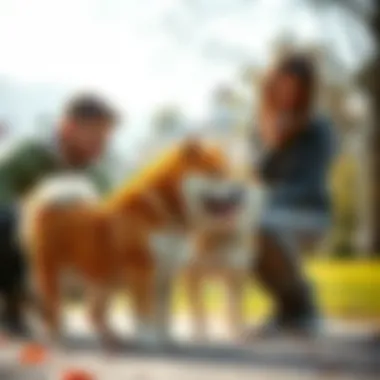

Opting for breeders with a solid reputation can save you future heartaches. A reputable breeder often provides health guarantees and is willing to discuss their breeding practices in-depth. Their willingness to share knowledge points to their commitment to the breed and, by extension, their puppies.
Impact of Negative Reviews
Negative reviews can be a red flag that should not be ignored. When a breeder receives criticism, it's critical to delve deeper into the context of those reviews; these comments can be insightful.
- A pattern of complaints, particularly regarding health issues in pups, is concerning. Think about it: would you invest your time and resources into a breeder who's had multiple complaints of sick puppies or bad temperament?
- Importantly, don't dismiss outlier reviews without consideration. Sometimes, one dissatisfied customer might skew overall perceptions, so weigh all information critically.
Yet, negative reviews also provide an opportunity for growth. Responsible breeders may respond to criticism, indicating their willingness to improve and honor customer feedback. Here, you might gauge their character and whether they take ownership of mistakes.
The interplay between positive and negative feedback ultimately shapes industry standards—affecting prices as well. The more informed you are, the easier it becomes to separate the wheat from the chaff among breeders.
Bottom Line: Always pay close attention to what past buyers have to say about their experience. This will provide not only insight into the quality of the dogs but also the values and ethics upheld by the breeder. The investment goes beyond mere dollars; it involves trust and a commitment to the happiness of both the puppy and its new family.
Adopting vs. Buying
When it comes to welcoming a Shiba Inu into your home, one of the most significant decisions you'll face is whether to adopt or buy from a breeder. This isn’t just about how much you’re willing to put down on a puppy; it’s about understanding the wider implications of either choice. Both routes can lead to fulfilling experiences, but there are distinct factors worth considering.
Cost Differences
The price tag attached to a Shiba Inu varies dramatically depending on the source. If you choose to adopt, you might be looking at a minimal fee, often ranging from $50 to $300. This fee typically covers initial vaccinations, spaying or neutering, and sometimes even microchipping. On the flip side, purchasing from a reputable breeder can set you back several thousand dollars. Prices might stretch anywhere from $1,500 to $3,000, depending on factors like bloodline, breeder reputation, and specific geographic location.
In many cases, the upfront expense of buying from a breeder also includes certain assurances regarding the pup's health and lineage. It's prudent to weigh not only the immediate costs but also the long-term financial considerations associated with each choice.
Moreover, the cost of ownership extends far beyond the initial adoption or purchase price. Regardless of whether you adopt or buy, you should prepare for ongoing expenses like food, grooming, and healthcare.
Benefits of Adoption
Adopting a Shiba Inu can be immensely rewarding, often providing a second chance to a dog in need. With shelters and rescue organizations swamped with dogs, every adoption can be a lifeline.
Some of the key benefits include:
- Saving a Life: By adopting, you're directly contributing to the welfare of animals and clearing up space in shelters.
- Cost-Effectiveness: Adoption fees are typically much lower than purchasing from a breeder, giving both newcomers and seasoned pet owners a more affordable pathway to dog ownership.
- Established Temperament: Many shelters have behavioral assessments in place. They can offer insights into the dog’s personality, helping you match with a Shiba Inu that fits your lifestyle.
- Support for Rescue Organizations: Many rescues provide essential resources after the adoption. This can take the form of training support or community resources to help with any challenges you face.
However, it’s crucial to note that while adopting can be a heartfelt choice, it's not void of challenges; some adult dogs may come with behavior issues rooted in past experiences. But with patience and love, many can thrive in a caring home.
Choosing between adopting or buying is laden with emotional depth and financial implications. Both paths have their unique merits and challenges, and understanding them is key to making an informed decision as you prepare for Shiba Inu ownership.
Final Thoughts on Shiba Inu Ownership Costs
When considering bringing a Shiba Inu into your home, it’s crucial to grasp the complete financial picture involved in ownership. The costs do not merely stop at the initial purchasing price but branch out into various ongoing expenses, creating a long-term financial commitment. Understanding the associated expenses, and the nuances of this commitment, can empower potential Shiba Inu owners to make informed decisions.
The financial responsibility entails evaluating the total investment needed not just for the dog itself but for quality care, training, and even potential emergencies. This section will detail critical elements to focus on, helping you understand the broader scope of ownership costs in a holistic manner.
Evaluating Total Investment
Determining the total investment for owning a Shiba Inu involves more than just the sticker price. Beyond the pure cost of purchasing a Shiba Inu, other factors come into play:
- Initial Purchase Price: As previously discussed, this could vary significantly depending on the breeder, location, and pedigree.
- Setup Costs: This includes purchasing necessary items like a bed, food bowls, leash, collar, and perhaps some fun toys. Also, don't forget the first time vet checkup and vaccinations which could add a chunk to the initial cost.
- Monthly Expenses: Regular food needs, grooming, and supplies can mount up. These ongoing monthly costs should be factored into your yearly budget.
- Healthcare and Emergencies: Veterinary fees can be unpredictable especially if your pet encounters health issues. Setting aside an emergency fund for veterinary care is always a prudent approach.
- Training: Shiba Inus are known for their spirited personalities. Investing in professional training can save a lot of heartache down the road and ensure a well-behaved dog.
Each of these elements contributes to what can be an unexpected financial burden if not carefully planned. Understanding each facet helps in avoiding any nasty surprises and ensures that you’re well-prepared for the responsibilities that come with ownership.
Long-Term Financial Commitment
Owning a Shiba Inu can be a delightful experience, but it’s far from a short-term endeavor. Individuals must keep in mind that these dogs are not only a financial investment but also a commitment over their lifespan, which typically ranges between 12 to 15 years.
During that time, consider factors such as:
- Inflation of Prices: Just like everything else, the cost of your dog's food, veterinary visits, and supplies can go up. Have a rough estimate of how much more it might cost down the road.
- Life Changes: Your own financial status may shift over time, affecting how much you can afford to spend on your Shiba Inu. It’s wise to evaluate your situation regularly.
- Planning for Aging: As with humans, pets may need increased medical attention as they age. Preparing for these potential costs will only prepare you better.
Owning a Shiba Inu encapsulates a long-term financial commitment that may involve sacrifices in other areas. The joy and companionship provided by your fluffy friend can certainly outweigh the monetary considerations, but it is essential to enter this venture with your eyes wide open.
"The joy of a dog comes at a cost, but the love and companionship are truly priceless."





